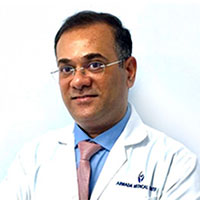- Home
- >
- Masticatory Muscle Disorders and...
Masticatory Muscle Disorders and Myofascial Pain
Dentistry
August 31, 2022 - 16:00 - 17:00 (UAE time)
Topic Description :
Masticatory Muscle Disorders and Myofascial Pain
Abstract:
The function of the masticatory system is complex. Discriminatory contraction and relaxation of various head and neck muscles is necessary to move the mandible precisely to allow effective functioning. A highly refined neurologic control system regulates and co-ordinates the activities of various muscles of the body. Masticatory muscle disorder is a subtype of TMDs and are caused by a combination of multiple factors. Pains of muscle origin are the most frequent cause of discomfort in the head & neck area. Myofascial pain is a regional myogenous pain condition characterised by local area of firm hypersensitive bands of muscle tissue known as Trigger points.
Introduction:
Pains of muscle origin are the most frequent cause of discomfort in the head and neck area. Because dental pain is the most frequent oral, a good rule to follow in diagnosing pains around the face and mouth is to assume initially that it is dental until proved otherwise, then muscular until proved otherwise. The possibility of orofacial pain being of muscle origin should be taken into account with every complaint. Muscle pain emanates from the skeletal muscle, tendon and fascia. Myogenous pains of different types may involve muscle of the mouth, face and neck. The symptom complex depends on the kind, number and location of muscle involved and to the degree to which they are affected.
Learning Objectives:
- A neurological mechanism is responsible in the pathophysiology of various masticatory muscle disorders.
- Musculoskeletal pain condition varies from being a primary pain condition with no etiological factors to being secondary to other diseases/conditions.
- A careful history & clinical examination of the head, jaw and neck muscles will facilitate a tentative diagnosis which may be followed by additional investigations to arrive at a final diagnosis.
- Other than the use of Bitewing Periapical or Panoramic radiography to look for odontogenic pathology, additional imaging is not all required for muscular disorders.
- Management options for masticatory muscle disorders consist of patient education and self-management, pharmacotherapy, physical therapy, spray and stretch, trigger point injections & Cognitive Behaviour Therapy.
Speaker :

Dr. Sumit G Gupta
BDS, MDS ( Orthodontics)
Diplomate, American Board of Orofacial Pain
Director
RAK Dental Care & Implant Centre – Ras Al Khaimah
UAE
Bio:
Dr. Sumit Gupta, is a Specialist Orthodontist in Armada Medical Centre, Dubai. a Diplomate of the American Board of Orofacial Pain, Fellow – Temperomandibular Disorders, Orofacial Pain and Dental Sleep Medicine and did mastership from Roseman University, School of Dental Medicine, USA. He is a Certified Invisalign Provider and Incognito Certified Lingual Orthodontist. He is practicing in UAE for the past 24 years. Dr. Gupta is a DOH, DHA & MOH licensed Specialist Orthodontist.
Accredited by
INDEX Conferences & Exhibitions Organisation Est is an ADA CERP Recognized Provider. ADA CERP is a service of the American Dental Association to assist dental professionals in identifying quality providers of continuing dental education. ADA CERP does not approve or endorse individual courses or instructors, nor does it imply acceptance of credit hours by boards of dentistry. INDEX Conferences & Exhibitions Organisation Est. designates this activity for 1 continuing education credits.

The International Congress For Health Specialties – ICHS certifies that the Waterfalls Initiative for Continuous Education who are organizing the Masticatory Muscle Disorders and Myofascial Pain Webinar adopting an online learning format on August 31, 2022 shall be awarded 1 ICHS CME Credits
Organised By

